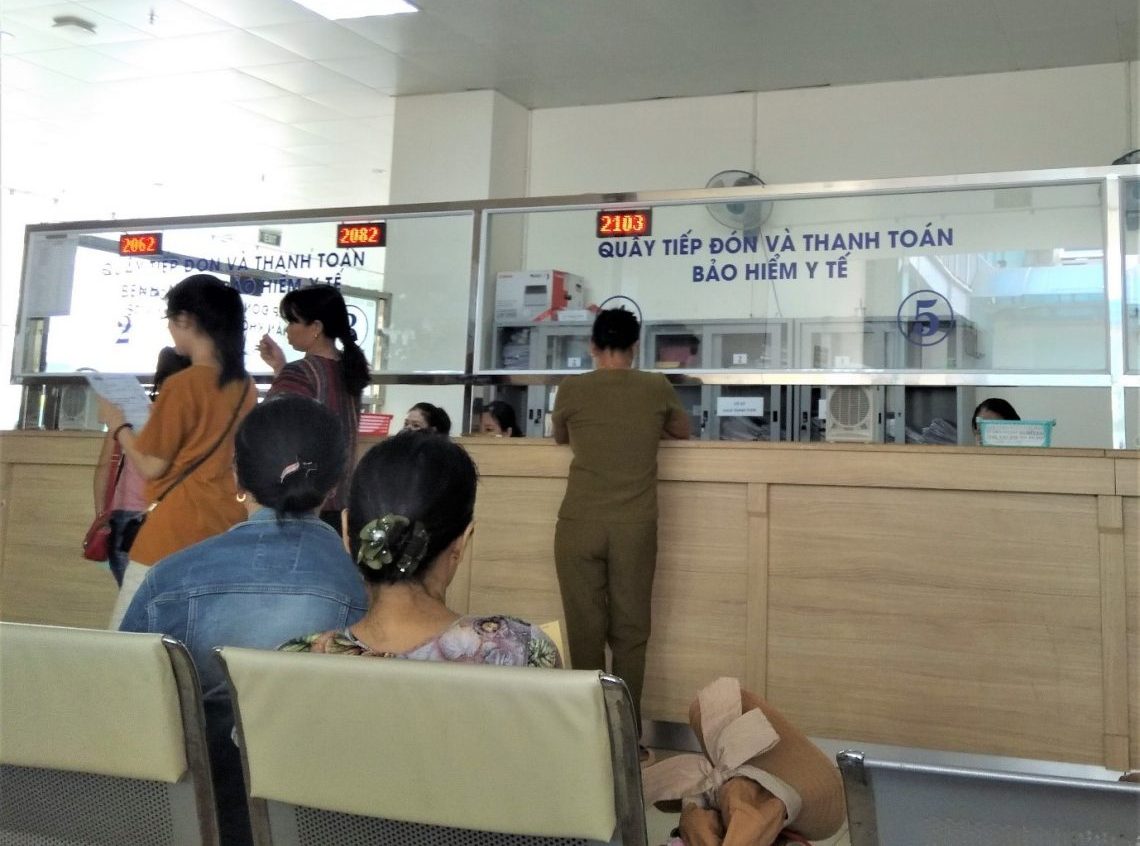
Hospital reception in Vietnam (Credit: Trang Do)
Cancer patients and COVID-19 in Vietnam: disruptions and reforms
By Trang Do
19 June 2020
On 20 March, Vietnam’s Ministry of Health confirmed that two nurses at Bach Mai Hospital in Hanoi were infected with COVID-19. Bach Mai is one of the two largest general hospitals in Vietnam, with an annual average of 1.5 million outpatient visits. Immediately after the discovery of the two confirmed cases, 150 other staff at the Tropical Diseases Center where the two nurses were working went into quarantine and the centre was closed. Two days later the hospital announced that it would cease receiving incoming patients to consulting divisions at all departments, including those with an appointment.
Since the first case of COVID-19 was identified in Vietnam in January 2020, there have been mounting concerns among patients living with cancer about follow-up care. Patients and their families have been posting questions to peer support Facebook groups asking whether they should visit the hospital as scheduled.
Routine visits to hospitals for many cancer patients are often troublesome at the best of times. In my ethnographic research in 2019, I interviewed cancer patients across the central region of Vietnam when they visited hospitals to obtain their monthly hormonal medication. The receipt of medication took about three minutes, but the patient’s journey to the urban hospitals where the major of oncology centres in Vietnam are concentrated took a couple to a dozen of hours using different transportation means, with the costs entirely borne by the patients. They additionally had to get through a day-long process, involving several checks of their administrative insurance cards and hours-long waits on a hard steel bench in the hospital’s corridor.
Some cancer patients have to visit the hospital every month. According to existing universal health insurance regulations, breast cancer patients on hormonal therapy are entitled to only one dose of medication in a 28-day period. Others have to visit much more often. Some advanced-stage breast cancer patients receive a maximum ten-day dose of their medication, and hence need three visits to the hospital every month.
COVID-19 has added another row of hurdles, which now often dissuades patients from visiting hospitals to obtain their prescription. At a regional or national cancer ward, such as the one within Bach Mai Hospital where a few hundred outpatients visit every day, social distancing is challenging, provoking anxiety for patients as well as hospital workers. In response to the pandemic, the Ministry of Health issued a new regulation on 20 March allowing healthcare providers to prescribe elderly people and outpatients with chronic diseases a maximum three-month dose of medication. At the same time, Vietnam’s Social Security – the state agency in charge of social and health insurance – signed a letter to allow insured patients with chronic medical conditions to obtain up to two-months of medication at a time during the COVID-19 period. These measures are timely and responsive to the evolving situations, but more is needed.
For one thing, patients should be able to make or revise their appointments via phone, the hospital’s website, or on a mobile app. This would allow hospitals to monitor the number of incoming patients, and reduce waiting times and crowding.
Second, a database of outpatients is necessary for hospitals to keep track of follow-up compliance and to communicate changes in the hospital’s operation and insurance-related regulations to patients. This would enable patients to make informed choices.
Third, those in a stable condition should be able to receive their monthly medication via their nearest medical centre or through the postal service. A delivery cost-sharing mechanism should be considered between the insured and the insurer. This would help save travel costs and time particularly for remote patients. It would also reduce the workload of hospital staff, and relieve overcrowding at urban hospitals.
Other countries are likely facing similar challenges, and these reform suggestions have a broader application. COVID-19 has posed an unprecedented challenge; however, it also offers a unique opportunity for governments, hospitals and insurance agencies to review their operating policies and work together for the better. This global pandemic could lead to reforms, in Vietnam and elsewhere, towards more efficient operation of hospitals and administration of insurance schemes, and a significant reduction in barriers to patient adherence.
The post is part of the #COVID-19 and Asia series.
About the author/s
Trang Do
Trang Do is a PhD scholar at Monash University in Australia, and Research Associate at the Institute for Social Development Studies in Vietnam.
